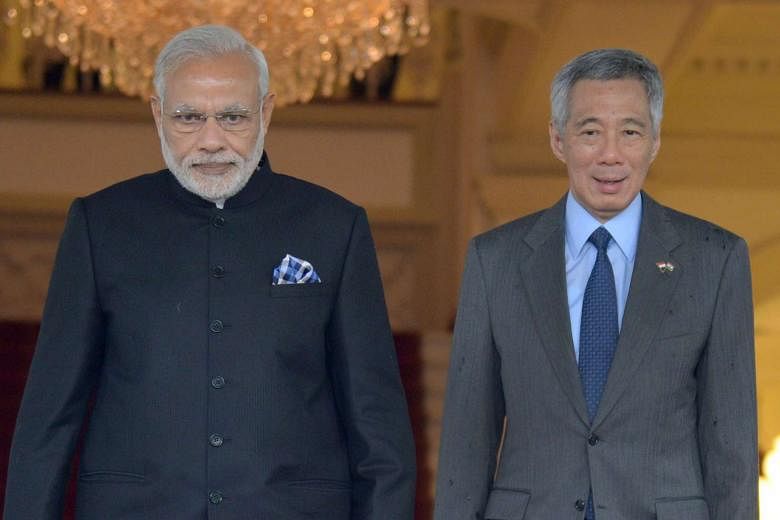SINGAPORE - Singapore will support India's development where it can and looks forward to the country integrating more closely with South-east Asia, Prime Minister Lee Hsien Loong said.
Raising a toast to his visiting Indian counterpart Narendra Modi at an official lunch at the Istana on Tuesday (Nov 24), Mr Lee said Indian immigrants had played a large part in building modern Singapore.
Aside from labourers, businessmen and civil servants, no less than five foreign ministers of independent Singapore had been of Indian origin, promoting the island's interests abroad.
"Singapore today has a thriving community of Indians who are well-integrated in our society and form an essential part of our multi-racial, multi-religious mix," he said. "India has been very much a part of Singapore's history."
Aside from pioneers such as Mr G Sarangapany, who founded the Tamil Murasu newspaper, Mr Rajabali Jumabhoy, a Gujarati businessman, was the first president of the Singapore Indian Chamber of Commerce and Industry.
There were also social workers and religious leaders like Maulana Abdul Aleem Siddique from Meerut who established the social welfare organisation Jamiyah in 1932 and the Inter-Religious Organisation in 1949. There also were Sikhs who contributed in many fields, including the armed forces and judiciary, Mr Lee said.
Tracing the connection with India to the 13th century, Mr Lee noted that Singapore was part of the Majapahit Empire, one of the Indianised kingdoms in Southeast Asia.
"Long before the term 'soft power' was coined, Indian influences left their mark on our traditions and landscape," he said, noting that even the names Indonesia and Indo-China attest to India's far reaching influence. Besides, Islam had come to the region through India.
Mr Modi's visit to Singapore, he said, came at a significant time when the two nations were celebrating the 50th anniversary of diplomatic relations.
"We believe India is a great Asian country that has a lot to contribute to the region and we wish India well in its reforms and development," he said. "We hope to develop our economic cooperation, air links, and broader cooperation and we are happy to support India's development where we can, because this is a mutually beneficial relationship."
Mr Lee said Singapore looked forward to India playing an important role in the region, promoting regional security and peace, integrating its economy with the rest of the region, and helping to shape an open and inclusive regional architecture.
Then-PM Goh Chok Tong had been an early advocate for India's Look East policy and helped to bring India in as Asean's Dialogue Partner. Singapore also supported its entry into the Asean Regional Forum and the East Asia Summit.
Noting the defence cooperation agreement that had just been signed, he said Singapore soldiers already exercise with the Indian miltary.
"The revised agreement will deepen our cooperation by introducing regular dialogue between our Defence Ministers," he said.
"We look forward to India integrating its dynamic economy more closely with the region, as we strive to complete a high-quality Regional Comprehensive Economic Programme (RCEP)."
In reponse to the speech, Mr Modi raised a toast to PM Lee and Singapore celebrating the relationship between the two countries.

